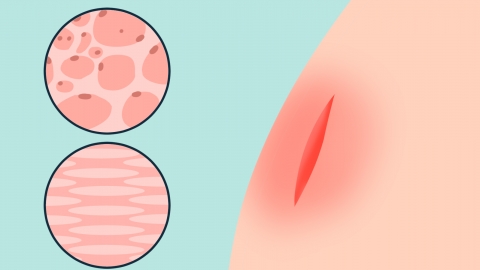What does it mean when a wound is not bleeding?
Wound not bleeding may be caused by a superficial wound that does not involve blood vessels, normal platelet clotting function, reduced platelet count, deficiency of coagulation factors, or abnormal blood vessel walls. If abnormalities occur, prompt medical attention is recommended. Specific analysis is as follows:

1. Superficial wound without vessel involvement: The wound only damages the superficial layer of skin and does not reach subcutaneous capillaries or larger blood vessels, so bleeding naturally does not occur. Clean the wound with normal saline, apply mupirocin ointment to prevent infection, and cover with sterile gauze or a band-aid to protect the area.
2. Normal platelet clotting function: Platelets rapidly aggregate upon contact with the wound, forming a clot to seal off damaged blood vessels and stop bleeding—this is a normal physiological hemostasis process. No special treatment is required; keep the wound clean and dry, and avoid getting it wet.
3. Reduced platelet count: Insufficient platelet production or excessive destruction leads to impaired clotting function. Even deep wounds may show little or no bleeding, often accompanied by skin bruising or gum bleeding. Under medical guidance, medications such as amorphous peptide tablets, caffeic acid tablets, or recombinant human thrombopoietin injection may be used. Avoid strenuous activities to prevent injury.
4. Coagulation factor deficiency: Congenital or acquired deficiencies in coagulation factors impair the clotting process, resulting in slow or absent wound hemostasis, often accompanied by joint bleeding or muscle hematomas. Doctors typically recommend treatments such as human coagulation factor VIII injection, prothrombin complex concentrate injection, or vitamin K1 injection. Avoid trauma in daily life.
5. Abnormal blood vessel walls: Structural or functional abnormalities in blood vessel walls reduce their ability to constrict, preventing effective closure and hemostasis at the wound site. This may be accompanied by skin capillary dilation or nosebleeds. Under medical supervision, vitamin C tablets, rutin tablets, or troxerutin tablets may be taken to improve vascular elasticity and reduce external irritation.
In daily life, wounds should first be cleaned and disinfected, with attention paid to wound depth and bleeding status. If wounds frequently fail to bleed and are accompanied by other bleeding symptoms, timely medical evaluation of coagulation function is necessary.





